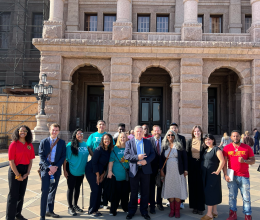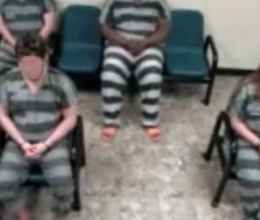
Imagine being arrested and accused of a crime. You ask to speak to a lawyer — like most people do — but that request is ignored. Your only way to avoid being locked up is to have $2,000 ready to pay money bail. But you don’t have access to that kind of cash, so you spend nearly two months locked in jail, solely because you were unable to pay for your freedom.
Now imagine all of this happening while still being presumed innocent in the eyes of the law.
That is exactly what happened to Aaron Booth, the lead plaintiff in the ACLU of Texas’ class action lawsuit against Galveston County. Mr. Booth was caught in wealth-based detention, or the system that sets often arbitrary money bail amounts with little consideration of other factors, like the likelihood that a person will return to court voluntarily (by the way, most people do). As a result of this unjust system, Mr. Booth lost his job while he spent 54 days in jail.
Recently, the ACLU of Texas received some positive news in Aaron’s lawsuit regarding the U.S. Constitution’s Sixth Amendment guarantee to legal counsel. A federal district court judge ruled that Galveston County cannot legally jail anyone until trial without first giving them access to a lawyer to help them argue for their freedom. In Mr. Booth’s case, if he had access to a lawyer, he may have been assessed an affordable bail and not left to suffer.
But it appears that Galveston County’s felony judges would like to see the old, unfair money bail system continue to the detriment of their community. Immediately after the federal court’s ruling on the right to counsel, Galveston County’s felony judges appealed. They additionally asked for a 30-day delay in implementing the ruling, which was denied.
As the lawsuit has unfolded, more and more evidence has emerged that the county’s felony judges have put up stubborn and fierce resistance to good-faith attempts to reform Galveston’s two-tiered bail system for the better.
For example, one of the felony judges disregarded another magistrate judge’s pretrial release orders, which would have allowed people to go free until their court dates. When questioned about the incident, the head of the county testified that this felony judge disobeyed his magistrate colleague’s release orders “just to screw with” him. He further testified that arrestees’ freedom is “just a part of the game” for the felony judge.
Later, that same felony judge went so far as to write an op-ed in the local newspaper complaining that efforts to proactively address problems with the county’s bail practices were mere “meddling” with the felony judges’ business. As if pursuing fairness in the local criminal justice system was bothersome to him.
The legal drama unfolding over this issue is disheartening to say the least, especially coming from local elected officials. After all, pretrial detention can be truly devastating to people caught in it.
Research has shown that the longer someone sits in jail, the more likely they are to plead guilty just to be released, even if they are not actually guilty. Without access to sometimes exorbitant amounts of money to post bail for their freedom, people risk losing their jobs, their homes, and even their children. In contrast, people who are represented by a lawyer when their bail is set are significantly more likely to be set free and avoid these harms.
That is why we’re so pleased that as of September 25, 2019, Galveston County magistrate judges cannot throw people into jail without first having a lawyer at their side. And this means that Galveston County is one small step closer to a more equitable criminal justice system that treats all people the same, regardless of their income status.
But the fight to dismantle the unbalanced, two-tiered bail system is far from over. Our lawsuit continues, with several challenges at play, including an additional appeal from the county itself.
You can help us in our fight to end wealth-based detention. After all, you most likely already live in a county where people are jailed under unaffordable bail orders without lawyers to help them.
Contact your local elected officials via your county’s website and ask them how they are ensuring that pretrial release in your county is fair. You can also tell your state representative that you support statewide legislation to make sure we have lawyers at bail hearings in every county in Texas.
The more that community members stay aware of how their elected officials are acting, the more they can keep those officials accountable to cutting out the drama and demanding they make policy decisions that are in the entire community’s best interests.







